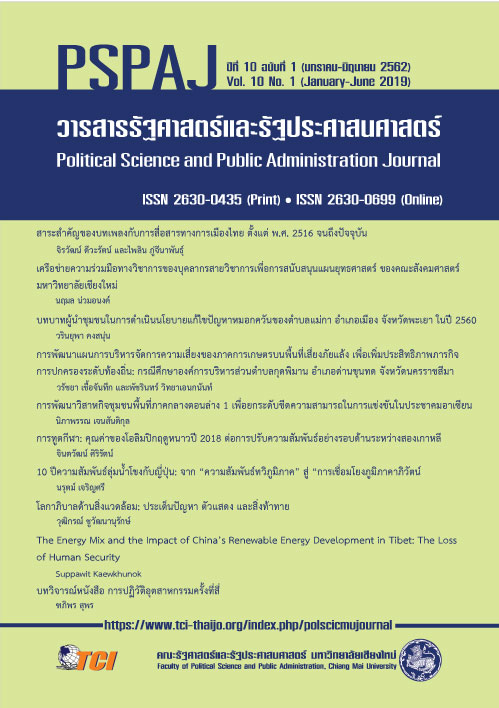Sports Diplomacy: The Merit of 2018 Winter Olympics toward Inter-Korean Inclusive Reconciliation
Main Article Content
Abstract
Sports have been part of politics and foreign affairs since Ancient Greece. They became the significant apparatus of several countries in 20th century, particularly in utilizing Olympic Games to serve their goals. South Korea also has taken an interest in the value of sports in both constructive and destructive ways. Korean President Moon Jae-in, who realizes the importance and the merit of sports in solving North Korea’s nuclear and missile crisis, seizes the opportunity to host the 2018 Winter Olympics in PyeongChang. By analyzing through the lens of Sports Diplomacy, this research found that the inter-Korean cooperation in the Winter Olympics not only reduces the antagonistic sentiment, but also spills over to political, security, and economic agenda. Empirical evidences are Kim Jong-un’s statement to pause nuclear program in the 3rd of April inter-Korean summit was in the month, as well as United States-North Korea historic summit took place in Singapore in June. These distinctly show that sports are the indispensable apparatus for improving inter-Korean relations.
Downloads
Article Details
- เนื้อหาและข้อมูลที่ลงตีพิมพ์ในวารสารรัฐศาสตร์และรัฐประศาสนศาสตร์ถือเป็นข้อคิดเห็นและความรับผิดชอบของผู้เขียนบทความโดยตรง ซึ่งกองบรรณาธิการวารสารรัฐศาสตร์และรัฐประศาสนศาสตร์ ไม่จำเป็นต้องเห็นด้วย หรือร่วมรับผิดชอบใดๆ
- บทความและข้อมูล ที่ได้รับการตีพิมพ์ในวารสารรัฐศาสตร์และรัฐประศาสนศาสตร์ ถือเป็นลิขสิทธิ์ของวารสาร หากบุคคลหรือหน่วยงานใดต้องการนำข้อมูลไปใช้ประโยชน์ในทางวิชาการ ขอให้อ้างอิงแหล่งที่มาด้วย
References
บีบีซี. (2561). สองเกาหลีตกลงส่งทีมนักกีฬาร่วมพาเหรดโอลิมปิกภายใต้ 'ธงรวมชาติ'. สืบค้นเมื่อ 18 มกราคม 2561, จาก https://bbc.in/2NKpuQ1
อภิเชษฐ กาญจนดิฐ. (2560). การเป็นเจ้าภาพกีฬานานาชาติของเกาหลีใต้: นัยพินิจทางการเมือง เศรษฐกิจ และความสัมพันธ์ระหว่างประเทศ (ค.ศ. 1970-2014). International Journal of East Asian Studies, 21(1), 21-47.
Berlinger, J. (2017). North Korea's missile tests: What you need to know. CNN. Retrieved December 10, 2017, from https://cnn.it/2Fjug6s
Beuge, A., Gutierrez, P., Levett, C., Sheehy, F., & Torpey, P. (2017). A guide to North Korea's advance toward nuclear weapons–in maps and charts. The Guardian. Retrieved May 30, 2018, from https://bit.ly/2yRybDh
Bridges, B. (2015). Flags, formulas and frustrations: North-South Korean Olympic ‘cooperation’. Asia Pacific Journal of Sport and Social Science, 4(3), 211-222.
Cha, V. (2009). Beyond the final score: the politics of sport in Asia. New York: Columbia University Press.
Cha, V. (2013). The Asian Games and Diplomacy in Asia: Korea–China–Russia. The International Journal of the History of Sport, 30(10), 1176-1187.
Choe, S.-H. (2018). South Korea proposes border talks with North Korea after Kim's overture. The New York Times. Retrieved January 21, 2018, from https://nyti.ms/2EzSyoZ
Ha, J.-P., Lee, K., & Ok, G. (2015). From Development of Sport to Development through Sport: A Paradigm Shift for Sport Development in South Korea. The International Journal of the History of Sport, 32(10), 1262-1278.
Houlihan, B. (1994). Sport and international politics. New York: Harvester Wheatsheaf.
Jarvie, G. (2003). Internationalism and Sport in the Making of Nations. Identities, 10(4), 537-551.
Joo, Y.-M., Bae, Y., & Kassens-Noor, E. (2017). Mega-Events and Mega-Ambitions: 2017 South Korea’s Rise and the Strategic Use of the Big Four Events. London: Palgrave Macmillan.
Kim, J. O. (2016). Selling the past: Korea and China's nation-branding to host Winter Olympic Games. China Media Research, 12(2), 23-29.
Kim, R. (2018a). How Moon and Kim make history. The Korea Times. Retrieved April 30, 2018, from https://bit.ly/2Nd9XHd
Kim, R. (2018b). Moon calls North Korea's nuke test suspension 'good signal'. The Korea Times. Retrieved April 30, 2018, from https://bit.ly/2mbJ23d
Ko, D.-H. (2018). Inter-Korean oceanic trade routes on rosy prospect. The Korea Times. Retrieved April 30, 2018, from https://bit.ly/2uvjn9m
Kobierecki, M. M. (2013). Sport in International Relations Expectation, Possibilities and Effects. International Studies: Interdisciplinary Political and Cultural Journal, 15(1), 49-74.
Koh, B.-J. (2018). N.K.'s denuclearization promise raises hope, but skepticism lingers over lack of detailed steps: experts. Yonhap News Agency. Retrieved April 30, 2018, from https://bit.ly/2KPISxg
Lee, J. W. (2016). A Game for the Global North: The 2018 Winter Olympic Games in Pyeongchang and South Korean Cultural Politics. The International Journal of the History of Sport, 33(12), 1411-1426.
Levkowitz, A. (2018). The 2018 Winter Olympics: Divided We Stand. BESA Center Perspectives Paper, (735). Retrieved May 3, 2018, from https://besacenter.org/perspectives-papers/2018-winter-olympics/
Manheim, J. B. (1990). Rites of Passage: the 1988 Seoul Olympics as Public Diplomacy. Western Political Quarterly, 43(2), 279-295.
Merkel, U. (2008). The Politics of Sport Diplomacy and Reunification in Divided Korea: One Nation, Two Countries and Three Flags. International Review for the Sociology of Sport, 43(3), 289-311.
Merkel, U. (2009). Sport, Politics and Reunification–A Comparative Analysis of Korea and Germany. The International Journal of the History of Sport, 26(3), 406-428.
Merkel, U., & Kim, M. (2011). Third time lucky!? PyeongChang's bid to host the 2018 Winter Olympics–politics, policy and practice. The International Journal of the History of Sport, 28(16), 2365-2383.
Murray, S., & Pigman, G. A. (2014). Mapping the relationship between international sport and diplomacy. Sport in Society, 17(9), 1098-1118.
Oh, J. (2017). South Korea’s regional disparities and the 2018 Winter Olympics for regional development: Big Push revisited. International Area Studies Review, 20(2), 144-159.
Olympic Games. (2018). IOC President Visits Democratic People’s Republic of Korea. Retrieved May 3, 2018, from https://bit.ly/2mfhbPL
Reuters. (2018). Olympics: IOC extends North Korea deadline for Pyeongchang Games. Reuters. Retrieved March 5, 2018, from https://reut.rs/2KR7fdW
The Korea Times. (2018). Seoul city seeks to co-host sports competition with Pyongyang. The Korea Times. Retrieved April 30, 2018, from https://bit.ly/2NMrqaU
Van Tassell, D. H., & Terry, D. A. (2012). An overlooked path to peace and stability: sport, the state and the case of the Koreas. Sport in Society, 15(6), 814-822.
Yi, W.-W. (2018). Propaganda posters underscore inter-Korean cooperation. Retrieved May 1, 2018, from https://bit.ly/2mfrRhp
Yonhap. (2018a). Full text of joint declaration issued at inter-Korean summit. Yonhap News Agency. Retrieved April 30, 2018, from https://bit.ly/2JeNaZr
Yonhap. (2018b). Two Koreas team up at table tennis worlds. The Korea Times. Retrieved May 10, 2018, from https://bit.ly/2Jh89eb
Yu, K.-G., & Park, S.-Y. (2015). Selection and concentration strategy in the sports exchange between North and South Korea. Journal of Asian Public Policy, 8(2), 215-229.


